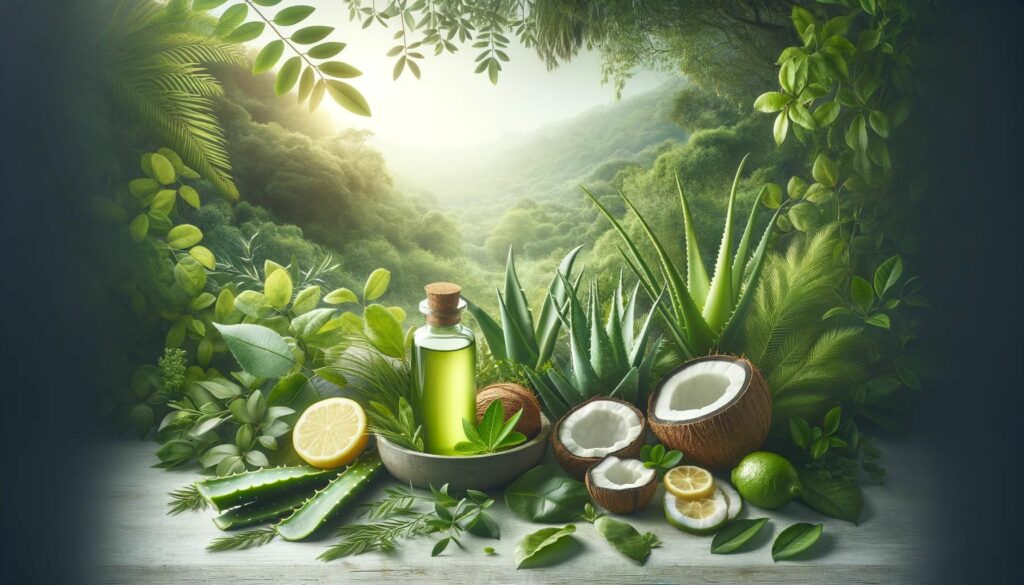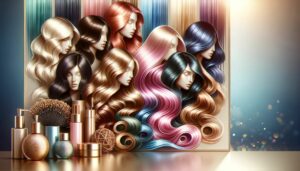
Blossoming Scalp Health
The Persistent Problem of Dandruff
Dandruff, a scalp ailment as old as time, is more than a mere sprinkling of white flakes upon one’s shoulders; it is a dermatological puzzle wrapped in a riddle. This condition, often misconstrued as a mere cosmetic nuisance, wields the power to impact the daily lives and self-esteem of those afflicted profoundly. It is a relentless intruder, turning a simple gesture like a nod into a snowfall of embarrassment. Understanding its intricacies is the first step towards reclaiming the dominion of one’s scalp and self-confidence.
Peeking into the Past: Historical Remedies for Dandruff
Historically, our ancestors, from ancient Roman bathhouses to the herbal savvy of the Far East, devised myriad solutions to combat this scalp predicament. Their legacy of natural remedies passed down through generations has endured the test of time, showcasing nature’s prowess in addressing what modernity often tackles with chemicals. These ancient practices, rooted in the wisdom of natural equilibrium, provide a treasure trove of knowledge and insight into holistic scalp care.
The Science of Scalp Health: What Causes Dandruff?
Dispelling the fog of myths surrounding dandruff requires a foray into the realm of science. Under the scrutinizing gaze of a microscope, the role of skin cells and sebum in scalp health emerges with clarity. Dandruff is not merely about visible flakes; it’s a ballet of biological processes gone awry. Understanding these nuances is pivotal in separating fact from age-old fiction, laying the groundwork for effective, science-backed scalp care.
Nature’s Pharmacy: Top Natural Ingredients for Dandruff
Nature, in its boundless wisdom, offers a plethora of remedies. Herbal wonders like tea tree oil and aloe vera stand at the forefront of this natural arsenal, acclaimed for their antifungal and soothing properties. Furthermore, the magic of essential oils such as lavender and peppermint transcends mere aroma, venturing into therapeutic realms and offering a natural panacea for the troubled scalp.
DIY Scalp Treatments: Crafting Your Home Remedies
The art of concocting scalp treatments in the comfort of one’s kitchen is both a science and a celebration of nature’s bounty. Simple yet effective recipes amalgamated from everyday ingredients can be potent allies in scalp health. Mixing and applying these treatments transforms the mundane into a self-care ritual, imbuing the scalp with nature’s healing touch.
From the Earth to Your Scalp: The Power of Clay and Mud
Mud and clay, often relegated to facial skincare, are unsung heroes in scalp care. Their detoxifying and absorbing qualities make them formidable foes against scalp impurities. Mud masks extend their therapeutic embrace beyond the visage, offering the scalp a detoxifying experience, while the natural absorbency of clay purifies and rejuvenates the scalp environment.
The Role of Diet in Scalp Health: Eating Your Way to Flake-Free Hair
Surprisingly, the path to a flake-free scalp commences at the dining table. Foods rich in specific nutrients wage a silent war against dandruff, fortifying the scalp from within. Hydration, often overlooked, plays a crucial role in maintaining scalp equilibrium. The adage “you are what you eat” finds profound relevance in the context of scalp health, underscoring the importance of a balanced diet in the quest for hair wellness.
Probiotics and Scalp Care: A Surprising Connection
Exploring the gut-scalp axis unveils a surprising connection between digestive health and scalp wellness. Incorporating probiotics through fermented foods and supplements can have a ripple effect, culminating in a healthier scalp. This interplay between gut health and dandruff underscores the holistic nature of our bodily systems, where improvement in one can lead to benefits in another.
Stress and Scalp: Managing Stress to Minimize Dandruff
The intricate link between stress and scalp health is a testament to the complexity of our bodily responses. Anxiety and stress can exacerbate scalp conditions, turning the mind into an unwitting enemy of hair health. Counteracting this through relaxation techniques such as yoga, meditation, and mindfulness can be a powerful tool in mitigating the effects of stress on the scalp.
Nature’s Moisturizers: Hydrating Your Scalp Naturally
The quest for scalp hydration finds its allies in nature’s moisturizers. Oils such as coconut, jojoba, and argan imbue the scalp with their hydrating essence, bringing their unique properties to the forefront of scalp care. Aloe vera, with its legendary soothing capabilities, stands as a sentinel of scalp hydration, offering respite from the annoying itch of dandruff.
Understanding pH Balance: Key to a Healthy Scalp
The journey to a dandruff-free scalp begins with an intricate understanding of the pH balance. Like a blossoming garden, your scalp flourishes under a balanced pH environment. The acid mantle, an invisible layer on your scalp, protects against harmful contaminants while maintaining moisture. Disruption of this balance often leads to dandruff and scalp irritation.
To preserve this delicate equilibrium, incorporating pH-balanced hair products is paramount. Shampoos and conditioners meticulously formulated to match the scalp’s natural pH can significantly alleviate irritation. Regular practices like rinsing your hair with diluted apple cider vinegar, known for its pH-restoring properties, also contribute to maintaining optimal scalp health.

Combating Dandruff with Ayurveda: Ancient Indian Wisdom
Ayurveda, India’s traditional system of medicine, offers a treasure trove of remedies for dandruff. Herbs like Neem and Brahmi stand out in their efficacy. With its antifungal and antibacterial properties, Neem acts as a natural cleanser, purging the scalp of dandruff-causing microbes. Brahmi, on the other hand, soothes the scalp and fortifies hair roots.
Integrating these herbs with carrier oils, an Ayurvedic scalp massage nourishes the scalp and ensures deep relaxation. This ancient technique enhances blood circulation, promoting a healthier scalp and hair.
Traditional Chinese Medicine (TCM) and Scalp Care
TCM offers a unique perspective on scalp health, emphasizing the balance of internal energies. Herbs like Ginkgo Biloba and Ginseng, revered in TCM, are known for their scalp-rejuvenating properties. They stimulate blood flow, nourish hair follicles, and reduce dandruff.
Acupuncture, a staple in TCM, can be surprisingly beneficial for scalp health. Targeting specific meridians can help regulate hormonal imbalances and stress, common culprits behind scalp issues.
The Role of Essential Vitamins and Minerals in Scalp Health
Vitamins E, B-Complex, and A are the scalp’s best friends. Vitamin E, with its antioxidant properties, protects the scalp from environmental stressors. The B-complex vitamins, particularly Biotin (B7), are crucial for hair growth, while Vitamin A helps in sebum production, preventing dry scalp.
Trace minerals like Zinc and Selenium play a pivotal role. Zinc aids in the repair of tissue and keeps the oil glands around hair follicles working optimally. Selenium, with its antifungal properties, helps fight off dandruff-causing fungi.
Eco-Friendly Scalp Care: Sustainable and Kind to the Planet
In an era of environmental consciousness, eco-friendly scalp care options are not only beneficial for you but also for the planet. Ingredients like organic aloe vera, tea tree oil, and organic coconut oil are effective in treating scalp issues and ensuring sustainability.
DIY treatments using these ingredients reduce your carbon footprint and offer a personalized approach to scalp care. Free from harsh chemicals, these treatments are a testament to the harmonious relationship between nature and personal health.
Sensitive Scalp Solutions: Gentle Care for Delicate Skin
Sensitive scalps require a nuanced approach. Identifying your scalp type is the first step. For sensitive scalps, mild remedies like oatmeal masks or aloe vera gel provide soothing relief without aggravating the skin.
It’s essential to avoid products with harsh chemicals and fragrances that can irritate sensitive skin. Instead, opt for natural, fragrance-free options that are gentle yet effective.
Seasonal Scalp Care: Adapting to Weather Changes
Each season presents unique challenges for scalp health. Combining heat and humidity in summer can lead to excess oil production and dandruff. Light, hydrating scalp treatments and regular washing can counteract these effects.
Winter, conversely, often brings dryness, leading to a flaky, itchy scalp. In these colder months, nourishing oils and deep conditioning treatments can preserve moisture and protect the scalp.
Avoiding Common Scalp Care Mistakes
Common mistakes in scalp care, such as over-treatment and harsh chemicals, can exacerbate scalp issues. It’s crucial to understand that less is often more regarding scalp care. Gentle, regular maintenance is preferable to intense, sporadic treatments.
Choosing the right products and avoiding those with harsh detergents like sulfates and parabens can prevent irritation and maintain scalp health.
Expert Opinions: What Dermatologists Say About Natural Scalp Care
Dermatologists acknowledge the benefits of natural remedies but also caution against over-reliance on DIY treatments. They emphasize the importance of a balanced approach that includes natural and medically approved treatments.
Experts often debate the efficacy of DIY remedies, highlighting the need for personalized solutions based on individual scalp conditions.
Conclusion: Embracing Nature’s Bounty for Scalp Health
In conclusion, the journey to a healthy scalp is multifaceted, intertwining ancient wisdom with modern science. While embracing nature’s bounty in scalp care, finding a balance that works best for your unique needs is crucial.
Experimenting with different natural remedies while staying informed and consulting experts can lead to a dandruff-free, healthy scalp. Remember, your scalp reflects your overall health and deserves as much care and attention as any other body part.





